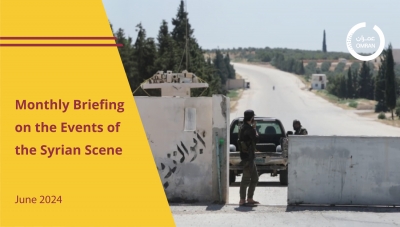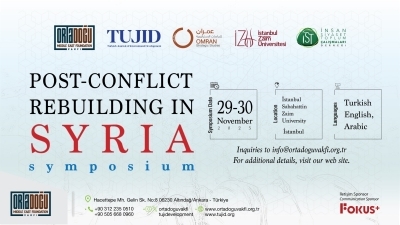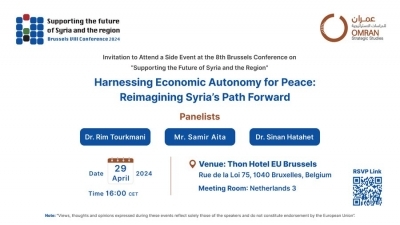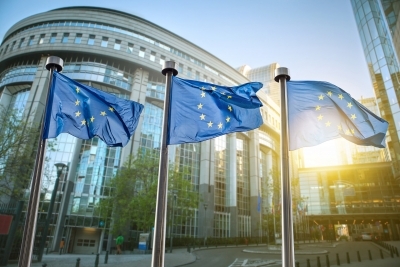General Summary
This report provides an overview of the key events in Syria during the month of June 2024, focusing on political, security, and economic developments. It examines the developments at different levels.
- Politically, the normalization steps between Turkey and the Assad regime are progressing. The announcement of local elections by the Autonomous Administration has angered Turkey, increasing its threats.
- Security, violence has escalated across Syria, with 429 civilian and 700 military casualties in the first half of the year.
- Economically, the significant rise in prices continues to be a major issue, alongside increased Iranian influence in the Syrian financial sector.
Turkish Normalization with the Assad Regime: Political Transformations and Future Outcomes
The most discussed topic regarding the Syrian issue is the latest developments in Turkish rapprochement with the Assad regime. Following the Iraqi Prime Minister's statement about creating a basis for dialogue between the regime and Turkey and confirming that talks are ongoing, Turkish statements about upcoming normalization steps followed. The Assad regime has waived its previous condition of Turkish forces' actual withdrawal from Syria to merely declaring their readiness to withdraw and making commitments, according to the regime's Foreign Minister Faisal Mekdad. The Turkish Foreign Minister emphasized the importance of the ceasefire between the regime and the opposition, urging the regime to rationally use this period of calm to resolve its constitutional issues, achieve peace with its opponents, facilitate the return of millions of Syrian refugees, and unite efforts with the opposition to combat terrorism, particularly the Kurdistan Workers' Party (PKK). Russia is intensifying efforts to expedite the normalization steps between the two sides and facilitate a presidential-level meeting between Erdogan and Bashar al-Assad, capitalizing on Turkish concerns about local elections and the entrenchment of the AANES project. Turkey is pursuing a “parallel tracks” policy to improve its relations with Moscow while preparing for the pre-US election period and the potential implications of a Trump administration on the region.
Despite the increased indications of Turkish rapprochement with the Assad regime this month, the normalization process began in late 2022 during quadrilateral talks at the security and intelligence levels under Russian auspices and Iranian participation. These talks went beyond being exceptional meetings to indicate the start of a new normalization path, though initially hindered by preconditions and external interventions. Turkey's insistence on bilateral meetings with the regime without other parties suggests it viewed the Iranian role as obstructive. As for the future of the normalization path, it still requires much time, as the proposed agenda from both sides seems complex and exceeds their capacities. Turkey aims to combat “terrorism” and dismantle the Autonomous Administration project in Northeast Syria, while the regime is unable to achieve this. The AANES 's High Election Commission announced the postponement of municipal elections, originally scheduled for June, to August in response to demands from political parties and alliances. The announcement of the elections faced Turkish rejection and threats to use force to prevent them, considering them a move towards division, as per Turkish statements. The US also declared that conditions are not conducive to conducting transparent and inclusive elections. This indicates that the postponement decision resulted from the lack of US support and serious Turkish threats, prompting local Autonomous Administration supporters to pressure for election cancellation to avoid new military operations. However, setting and then postponing the election date put the Administration in a dilemma, making it appear dependent on Turkish approval for any future entitlements in Northeast Syria. The Administration insists on postponing rather than canceling the elections, while recent Turkish moves toward normalization with the regime primarily target the Autonomous Administration project and open doors to various scenarios for the region's future.
Separately, the Negotiation Commission held its periodic meeting in Geneva, attended by several civil society representatives from within and outside Syria and Arab and European state representatives. The final statement emphasized that UN Security Council Resolution 2254 is the legitimate framework for reaching a sustainable political solution, asserting that Syria is currently unsafe for refugee returns, and rejecting “sham elections” in regime-controlled areas and those planned by the Autonomous Administration.
Increasing Indicators of Violence Escalation in Different Influence Areas
Despite Jordanian understandings with the regime and Arab pressures on the drug trafficking issue, Jordan still faces the threat of smuggling networks. Authorities foiled the largest smuggling attempt in months, seizing 9.5 million Captagon pills and 143 kilograms of hashish intended to be smuggled through Jordan to a third country.
Regarding changes in the regime's military institution, following the cessation of extensive military operations and the regime's involvement in regional communication pathways, the regime seeks internal military structure changes. According to official statements, this aims to discharge reserve service members in three phases by the end of 2025, moving towards reliance on volunteers to build a professional army. Concurrently, the regime's Ministry of Defense issued an administrative order halting the recall of reserve officers aged 40 who have completed two years of service and discharging non-commissioned officers and reserve personnel who have completed six years of service.
In Suwayda, demonstrations against the regime continued, along with a campaign of posters against the People's Assembly elections scheduled for mid-July. The province also witnessed clashes between local armed groups and regime forces, sparked by the regime establishing a new security checkpoint following the abduction of 15 regime members by local groups in response to the regime's arrest of a civil activist.
In North Aleppo, the local council of Al-Bab city announced the opening of the Abu al-Zendin crossing between opposition and regime areas as an official commercial crossing to improve living conditions and enhance local economic activity. This decision coincided with increased indications of Turkish normalization with the regime and aligns with Russian understandings to open trade lines between influence areas. However, reactions varied, with traders and investors viewing it as a vital trade and movement artery and an opportunity to reduce smuggling operations and lower prices due to availability. Conversely, some residents and Syrian National Army members attacked the crossing, damaging some equipment in opposition to its opening, while several entities issued statements demanding civilian management of the crossing outside military faction control, overseen by local institutions responsible for managing the city and establishing mechanisms to secure the crossing economically and security-wise.
This month also saw a significant escalation in ongoing violence in Northeast Syria. The Syrian Observatory for Human Rights documented the killing of 62 people, including 40 civilians, by various means, resulting from 37 acts of violence, including tribal conflicts, murders, about 20 operations by ISIS cells, and Turkish drone strikes. Indicators of violence have also increased across influence areas, with the Syrian Network for Human Rights documenting the killing of 429 civilians in Syria during the first half of 2024, including 65 children, 38 women, and 53 under torture. The highest proportions of victims were in Daraa 27%, Deir Ezzor 18%, and 14% each in Raqqa and Aleppo. The military death toll reached around 700 fighters in different control areas.
Continuous Price Increases Deepen the Economic Crisis
Amid the regime's economic decisions affecting living standards, the requirement for smart cardholders to open bank accounts to transfer support funds is significant. The Council of Ministers stated this step aligns with restructuring support towards targeted and gradual cash support. The regime is expected to abolish current subsidies on bread, fuel, electricity, water, and phone services, shifting the burden to the private sector due to its inability to meet living requirements, leading to significant price hikes and free market sales.
Under Presidential Decree No. 17 of 2024, Bashar al-Assad granted a one-time financial grant of 300,000 SYP (approximately $20) to retirees and government employees, including civil and military workers in the public sector. Given the Syrian pound's devaluation against foreign currencies, the grant is symbolic, covering only a few meals and failing to meet citizens' basic needs.
Clothing prices increased by 200% compared to last year due to rising cotton and yarn prices and the government's lack of intervention to control prices or support the clothing sector. Confectionery prices in Damascus markets also doubled compared to last Eid al-Adha. Despite the arrival of eight Iranian oil tankers loaded with crude oil and gas at Banias port in Tartus countryside, indicating continued Iranian support and sanctions breaches, the regime raised fuel prices amid a local fuel crisis. Due to rising fuel prices and shortages, increased temperatures, and the start of the harvest season, amperage companies in Damascus and its countryside raised kilowatt-hour prices in several areas.
The regime's shift towards export policies, away from self-sufficiency and market regulation, caused price increases. The regime's exports increased by 30% in the first half of this year compared to the same period in 2023. However, the number of Syrian fruit and vegetable trucks exported to Jordan dropped by 80% due to Jordanian restrictions amid anti-drug smuggling efforts.
Iran continues to expand its influence in the Syrian financial sector by opening institutions and banks. The Islamic City Bank, jointly owned by Iran and Syria with a capital of 50 billion SYP, recently opened, making it the fifth Islamic bank in Syria. Meanwhile, Russian tourism investors supervised the construction of two tourism facilities in Latakia province, with 50% completion. The number of Russian visitors to Syria reached 780,000 by the end of May, a 10% increase from the same period last year.
In Northeast Syria, the AANES published the 2024 budget details, with total revenues of $670 million and expenditures of $1.059 billion, indicating a projected $389 million deficit. Turkish airstrikes on SDF economic hubs, including energy infrastructure, caused estimated losses exceeding $500 million, contributing to economic paralysis. Given the estimated $1 billion expenditures, the region continues to face living crises at all levels, including rising prices, material shortages, and poor public services. Meanwhile, the SDF began delivering the first batch of wheat procured from Northeast Syria farmers to regime grain collection centers in southern Qamishli, transporting over 2,500 tons of wheat in 24 hours.
In North Aleppo, the Syrian-Turkish Energy Company raised household and industrial electricity prices to 3.6 and 4.1 Turkish liras per kilowatt, respectively, citing changes in Turkish electricity prices. The Syrian Interim Government set wheat prices in its areas at $220 per ton, $110 less than last season and the lowest price among influence areas: $310 per ton in Idlib and Northeast Syria and $360 in regime areas. This price is disproportionate to farmers' production costs. In Idlib, the “Salvation Government” reiterated financial transfer delivery regulations in the sent currency to organize the financial market, increase trust, and enhance control over financial policies and price regulation, reducing the need for black market currency conversions.




